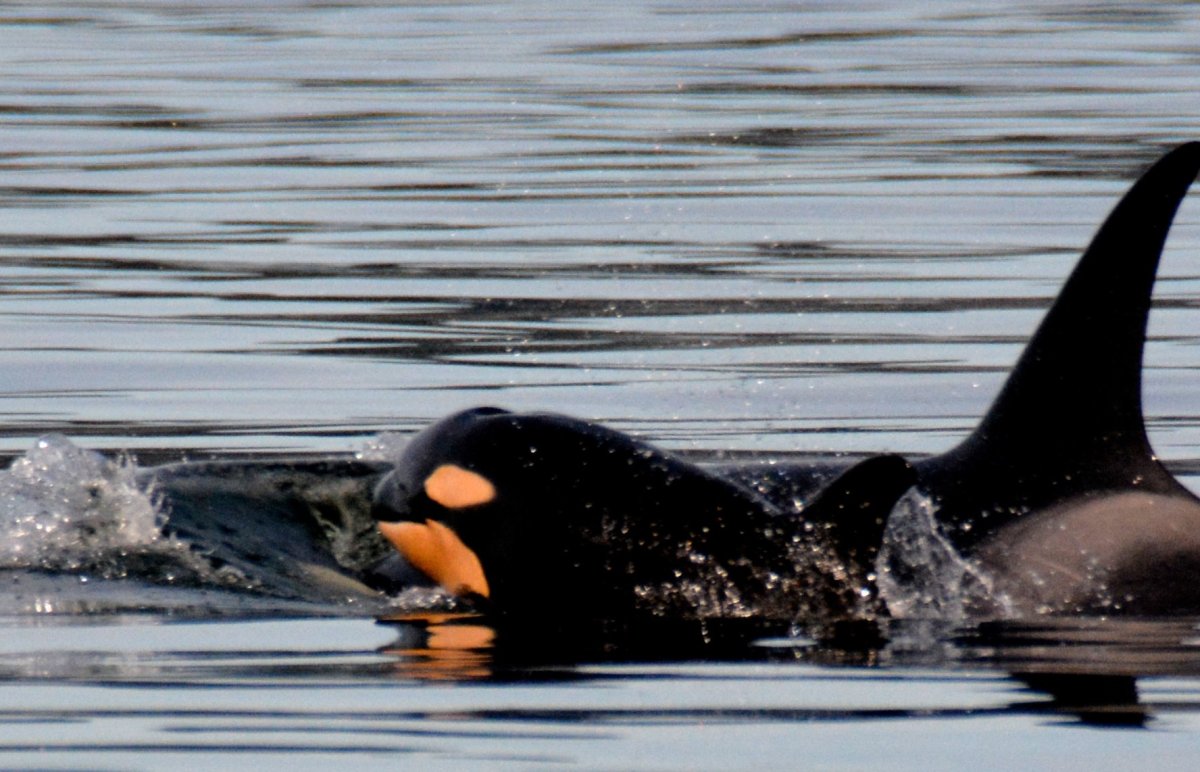A rare, "peachy"-colored newborn orca has been spotted in a Southern Resident pod in Washington.
The calf was spotted on December 26 by researchers Mark and Maya Sears, in Puget Sound, Washington, the Center for Whale Research said in a Facebook post. The calf belongs to the J pod, one of the most well known Southern Resident pods.
It was spotted swimming alongside a female orca known as J40, "who has not yet had a calf, as well as other J pod females," the Center for Whale Research said. "J40 seems to be the most likely mother, but we'll try to confirm this in subsequent encounters. The calf's sex is unknown. We hope to see lots more of this calf in the coming weeks and months, and that both the calf and its mother will be able to thrive."
This calf was not a part of the pod during recent sightings, meaning it is likely a newborn, the Center for Whale Research added. When it was sighted on December 26, it was probably only a few days old.
"The southern residents are a highly endangered population, so monitoring the population is crucial. In a population as small as the southern residents (under 80 individuals), each new birth is a bit of a boost, if the calves can survive," a spokesperson for the Center for Whale Research told Newsweek. "Females have an average interbirth interval of about 6 years, but this can vary quite a bit. The population can go years without successful births, but this year's been a relatively good one; this new calf is the third birth confirmed this year."
Donna Sandstrom, founder and director of whale research group The Whale Trail, told KING5 that newborn orcas are born with a "really distinctive peachy color" that "stays that way for a couple of weeks." This means they are quite easy to spot in the wild.
"Mark said the calf looked really healthy. He said it looked like it was trying to tail-slap. It was practicing tail slapping, which is just, so wonderful," Sandstrom said.
"It's not completely known where the peachy color comes from, but may have to due with their blubber layer being quite thin when they're born. This coloration is normal and fades over the first year," the spokesperson for the Center for Whale Research told Newsweek.
Sightings such as this are important for the conservation of the Southern Resident orca population.
With the birth of this new calf, it brings their entire population to 77, data from Orca Conservancy reports. Other known pods of Southern Resident orca are the L and K pods.
These orcas are only found in the northeast Pacific Ocean and unlike other orcas, only feast on salmon.
Not only is their population already small, but experts have been concerned about Southern Resident orca for a while due to their reliance on this salmon.
The numbers of Chinook salmon they feast on are declining, meaning so are the orca. In fact, the Southern Resident orca population has been declining for the past three decades.

"One of the problems this population has had, is some pods—especially K Pod—has had a hard time even getting pregnant, or having pregnancies come to fruition. So anytime there's a successful birth of a calf, everyone rejoices," Sandstrom told KING5.
Orca calves require a lot of protection, particularly in their first year of life. Considering the declining Southern Resident population, it is even more important for researchers to ensure the calf is not hassled by the public.
Sandstorm told KING5 that people may be tempted to venture out and capture a picture of the baby.
"That's the wrong thing to do. Give them 1,000 yards away, and give that baby and its mom a chance to survive," Sandstorm said.
Update, 12/29/23, 6:30 a.m. ET: This article was updated to include comment from a Center for Whale Research spokesperson.
Do you have a tip on a science story that Newsweek should be covering? Do you have a question about orca? Let us know via science@newsweek.com.
Uncommon Knowledge
Newsweek is committed to challenging conventional wisdom and finding connections in the search for common ground.
Newsweek is committed to challenging conventional wisdom and finding connections in the search for common ground.
About the writer
Robyn White is a Newsweek Nature Reporter based in London, UK. Her focus is reporting on wildlife, science and the ... Read more
To read how Newsweek uses AI as a newsroom tool, Click here.






